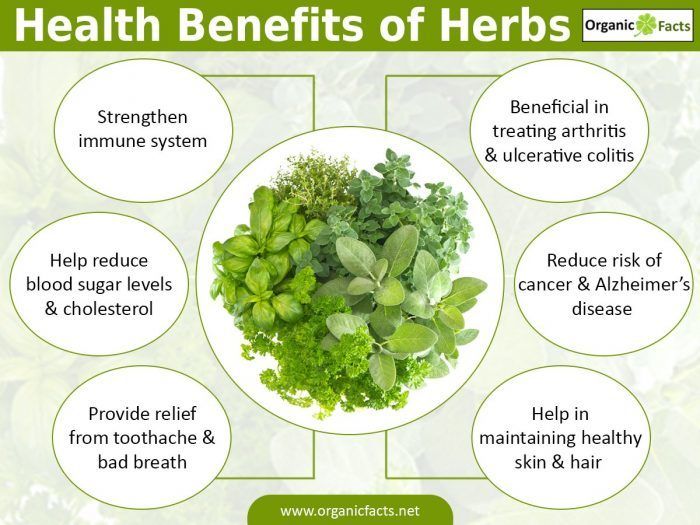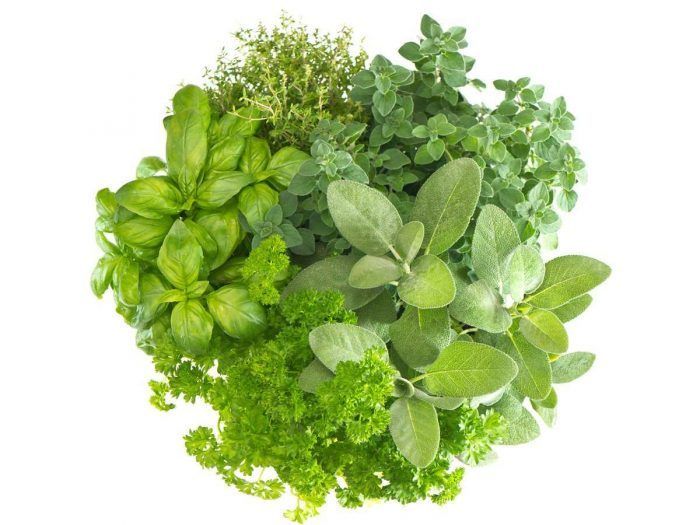There are countless herbs grown all across the globe. We have enlisted some of the most important herbs and their benefits below.
Aloe Vera: Aloe Vera is a stemless or very short-stemmed plant that grows 80-100 cm tall and spreads root sprouts. The leaves are thick, fleshy, and green with a ragged margin. Aloe Vera is a popular medicinal herb with healing components that include mannans, anthraquinones, polysaccharides, and lectins that grows in arid climates. This herb efficiently heals wound and burns. Moreover, drinking Aloe Vera juice is highly recommended for diabetes, minor skin infections, cysts, and elevated blood lipids. Aloe Vera extract is an important skin care agent.
Dill: This herb is an excellent source of niacin, dietary fiber, zinc, copper, and phosphorus, and it also has a host of vitamins like vitamin A, vitamin C, vitamin B6, riboflavin, folate, and minerals like iron, calcium, magnesium, potassium, and manganese. The herb helps in dealing effectively with issues like indigestion, diarrhea, insomnia, dysentery, hiccups, respiratory disorders, menstrual disorders, cancer and a number of others. This herb contains ‘Eugenol’, a volatile oil that has potent antiseptic and anesthetic powers. Dill also helps in the generation of breast milk and increases sperm count.
Chives: Chives belong to the onion family and are the smallest onions by size. These are enriched with vitamin A, vitamin C, vitamin Kand B vitamins like Thiamin, Riboflavin, Niacin, Pantothenic Acid, other minerals like Phosphorus, Magnesium, Folate, Potassium, Calcium, Iron, Copper, Manganese and Zinc, as well as dietary fiber. Chives help aid proper digestionand also stimulate the appetite. Moreover, it helps to digest fatty foods, improves the respiratory system, and prevents obesity through fluid retention. Chives help to keep cancer from developing, especially prostate cancer. It aids in alleviating fatigue issues, has mild anti-inflammatory properties, and kills germs in the intestines and colon.
Holy Basil (Tulasi): Holy Basil leaves are probably one of the most ancient herbs used for medicinal purposes. Holy basil leaves are rich in protein, riboflavin, folate, niacin, calcium, magnesium, iron, potassium, phosphorus, copper and zinc. Holy Basil also had high levels of vitamin E, vitamin A, vitamin C, vitamin K, and vitamin B6, and dietary fiber. Holy basil leaves aid in curing fevers (especially dengue and malaria) very quickly. Since ancient times, tulsi leaves have been added to tea, honey or warm water to cure colds, coughs, sore throats, and respiratory disorders. Holy Basil leaves have anti-inflammatory properties and are also effective in case of kidney stones, cardiovascular diseases, insect bites, skin infections, dental and eye problems. This herb has a special spiritual reverence in India.
Rosemary: Rosemary is a very good source of dietary fiber, vitamin A, vitamin C, folate, calcium, iron and manganese and a good source of vitamin B6, magnesium, potassium and copper. Rosemary has numerous health benefits like stimulating the nervous system, improving memory, relieving muscle pain, aiding in digestion, and eliminating circulatory problems, rheumatism, spasms, neuralgia, pain, eczema, wounds, and depression. Rosemary also increases urine production. Another fact about rosemary is that it can be used in combination with St. John’s Wort and ginkgo biloba to cure brain inflammation. It is effective in treating migraines and other variations of headaches as well. Rosemary oil is useful for proper digestion, skin and hair care.
Lavender: This herb is a symbol of purity and cleanliness. Lavender also speeds healing, relieves muscle tension, and reduces stress, while improving the circulatory, immune, and nervous systems. Lavender oil is a great antiseptic, carminative (relieves flatulence) and spasmolytic (relieves muscle spasms). The medicinal properties of this herb include anti-inflammatory, anti-fungal, and antiseptic abilities. In modern times, many stores sell lavender scent for perfumes, diffusers, soaps, talc and other cosmetics as well.
Peppermint: Peppermint is rich in phosphorus, niacin, potassium, copper, magnesium, manganese, riboflavin, folate, calcium, iron, zinc, and is a rich source of vitamin A, vitamin C, and dietary fiber. Peppermint is a good stomach calmer, especially if you are suffering from digestive problems, flatulence or any other related gastric problems. Mint restricts bacterial and fungal growth, as well as helping to relieve allergies and asthma. Many researchers say that mint also shows positive effects for cancer treatment, but further research is required to prove this. Mint juice is said to cure irritable bowel syndrome, thereby preventing constipation and colon ailments. The market has an abundance of mint-flavored toothpaste, juice, chewing gum, squash, ice tea, ice cream, and even medicines like laxatives and digestive syrups.
Fenugreek: Fenugreek seeds are often used as spices and the leaves of the plant are used as herbs. It is rich in protein, copper, magnesium, manganese, iron and dietary fiber. Apart from the seeds, the other parts of the fenugreek plant also have medicinal value. Intake of fenugreek balances cholesterol levels, treats diabetes and lowers blood sugar. The fenugreek seeds have lots of mucilage, which soothes gastrointestinal inflammation by protecting the stomach and intestinal linings. This herb cures inflammations and is thereby a home remedy for boils, abscesses, eczema, burns, and gout. Fenugreek is often recommended for pregnant women as it aids in child birth and milk production while lactating. However, this herb also has some side effects relating to gastrointestinal discomfort, thus it is advisable to consult a doctor before starting any supplementary tablets. Moderate amounts fenugreek herb or seeds in your diet will not have any such effects.
Psyllium: Psyllium is also known as ispaghula (‘Isabgol’ in India). This is usually found in husk form from the seeds of the Plantago ovate herb. Rich in soluble dietary fiber, psyllium is the major ingredient in many commonly used bulk laxatives. This herb usually helps to cope with constipation problems and intestinal ulcers, cleans the colon, and helps to control cholesterol, weight and blood pressure. However, if you are having problems like diabetes or if you are pregnant, consult a doctor before consuming psyllium.
Cayenne Pepper: Cayenne pepper is rich in niacin, riboflavin, magnesium, iron, potassium, manganese, vitamin C, vitamin A, vitamin E, vitamin B6, vitamin K, and dietary fiber. Cayenne pepper is best known for its beneficiary properties for the human circulatory system. This herb helps in keeping the blood warm and equalizes the blood pressure in the venous and arterial system – both of which are essential for a healthy circulatory system. This herb also helps in alleviating allergies and muscle cramps, while helping to improve digestion and healing wounds effectively. This herb works effectively for weight reduction,so many dieticians recommend cayenne pepper for a healthy and trim body.
Guggul: Guggul is a flowering plant widely used as medicinal herb. It helps in weight management, relieves arthritis pain and menstrual pain, improves circulation, lowers cholesterol and alleviates skin problems. This herb also increases white blood cell counts and protects against common ailments like the common cold, skin, dental and eye infections.
Hawthorn Berry: Hawthorn berry is a very valuable herb for the heart and cardiovascular system. It can dilate the coronary arteries and enhance the levels of blood and oxygen streaming to the heart muscle. This herb also dilates the blood vessels all over the body so that blood circulation does not exert as much pressure on the heart. It has antioxidant properties, thus preventing the possibilities of atherosclerosis and cancer. It regulates blood pressure, treats angina, and corrects arrhythmia (irregular heart beat). However, excessive doses of hawthorn can have side effects, so it’s better to consult a doctor before starting with this medication.
Ginkgo: This herb is derived from the oldest living tree species, known as ginkgo biloba. Ginkgo has immense health benefits due to its rich content of vitamin C and niacin. It helps in improving memory and mental clarity, which is why this herb is a popular ingredient in most brain tonics. It is commonly used to treat Alzheimer’s disease in elderly patients. This herb has also shown positive effects in treating tinnitus, vertigo, and other circulatory disorders. Ginkgo is helpful in combating stress and poor nutrition that can lead to cardiovascular disease, brain damage, hearing disorders, and other inciting diseases. It reduces anxiety, tension, and fights allergic reactions in the body. Ginkgo biloba is a great natural medicine for cholesterol, diabetes, hemorrhoids and asthma.
Butcher’s Broom: The roots and stem of butcher’s broom is specifically used for herbal medicines. It improves circulation, relieves constipation, enhances blood flow to important parts of the body like the brain and limbs, and cures hemorrhoids. Butcher’s broom also soothes the pain of rheumatism and arthritis, swelling, cramps, and other symptoms related to chronic venous insufficiency. This herb is also used as a mild diuretic and laxative.
Winter Cherry (Ashwagandha): Winter cherry is a well-known herb that is commonly used as a diuretic, aphrodisiac, sedative, revitalizing tonic, anti-inflammatory agent, and immune stimulator. It helps to reduce swelling and aids in retaining blood supply in the body. Furthermore, it aids in the proper functioning of the nervous system. It improves concentration, sexual abilities and asthmatic conditions.
Bacopa Monnieri (Brahmi): Like Tulsi, Bacopa is also another ancient herb used in medicines, especially in Asia. This medicinal herb is extensively used as a mental tonic, body revitalizer, memory enhancer and as a nerve tonic. It is best known for its ability to enhance memory and also helps to cope with the negative effects of stress. Bacopa is an excellent home remedy for a host of skin problems like psoriasis, eczema, abscess and ulceration. It is good for skin, hair and nail growth. Brahmi considerably reduces the oxidation of fats in the blood, thereby reducing the chances of cardiovascular diseases.
There are many more herbs found all round the world, and each one of them has special health benefits. Herbs like Azadirachta indica (Neem), Boswellia Serrata (Shallaki), Shilajit, St John’s Wort, Terminalia, Triphala, Wheatgrass are just a few more that are being discovered, studied, and added to the vast galleria of herbs that grow in different parts of the world. Use of some of the herbs is banned/restricted in some countries, so consult your local health specialist before use.



